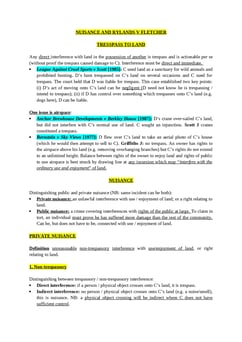Judgement for the case Stovin v Wise
KEY POINTS
If a statutory duty doesn't grant a right to bring a private lawsuit for its breach, it's unlikely that it would create a common law duty of care which would make the public authority liable to compensate for foreseeable losses arising from the non-performance of such.
FACTS
Ms. Wise turned right at a junction in Wymondham with limited visibility due to a bank obstructing the view. The Norfolk County Council had planned to remove the bank but failed to do so.
Ms. Wise entered the road, and Mr. Stovin, riding his motorbike, couldn't avoid a collision and crashed into her. In a negligence lawsuit, the High Court found Ms. Wise 70% at fault and the Council 30%.
The issue in question is whether the Council owes a common law duty towards the plaintiff due to its failure to take action.
JUDGEMENT
Appeal allowed. There was no duty of care on their end that would require them to remove the earthen bank.
COMMENTARY
The case raises crucial questions about whether omissions to act can establish a duty of care and the concept of 'proximity' in such scenarios. The case underscores the potential implications of imposing liability on public authorities for failing to address known dangers, while also considering the balance between individual moral choices, fairness, and public policy considerations.
ORIGINAL ANALYSIS
Plaintiff’s car was hit when R1 came out of a junction and hit him. They settled.
Plaintiff also sued the local council because the junction was notoriously dangerous and they had the statutory power to correct it, which gave rise to a duty of care. (NB The council were aware of the problem, but had not changed it because it would have involved changes to the land of a person who had not responded to the council’s request to change his land for the purpose of making the junction safer).
-
HL said council were not liable as the issue was not justiciable:
The decision was not irrational or ultra vires in some other way
It involved weighing up public interests.
However the court abandons the operational-policy limb of the justiciability test.
Lord Hoffman (delivering speech for majority)
Firstly the action (or rather omission) wasn’t justiciable.
-
Secondly omissions could not normally satisfy the ‘proximity’ requirement. This is because
Omissions liability inhibits freedom to make moral choices,
It would be unfair to pick on one person rather than another in a “good Samaritan” scenario where lots fail be good Samaritans, and
Economically an act should bear its own costs so that people make choices according to the cost to them: externalities distort our decision-making process i.e. we will be more careless if we can force others to pay for our mistakes.
Thirdly, even if there had been justiciability and proximity, a duty of care would not have been fair, just and reasonable (no precedent having established a duty of care for this scenario).
It would be bad public policy to make the council liable for highway problems since it would provide an incentive to drastically overspend so as to avoid liability and harm the ability of elected representatives to make free choices.
For Further Study on Stovin v Wise
Need instant answers? Our AI exam tutor is here to help.
Ask questions 🙋 Get answers 📔 It's simple 👁️👄👁️
Our AI is educated by the highest scoring students across all subjects and schools. Join hundreds of your peers today.
Get StartedSimilar Cases
Related Product Samples
These product samples contain the same concepts we cover in this case.
| Tort Law | Negligence Duty Of Care Notes (35 pages) |

 Since 2010, Oxbridge Notes has been a trusted education marketplace, supplying high-quality materials from top achievers at universities like Oxford, Cambridge, LSE, Harvard, and Yale.
Since 2010, Oxbridge Notes has been a trusted education marketplace, supplying high-quality materials from top achievers at universities like Oxford, Cambridge, LSE, Harvard, and Yale.